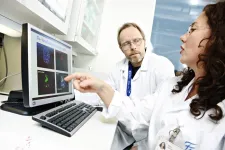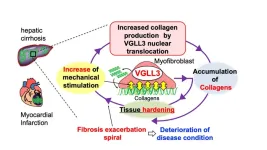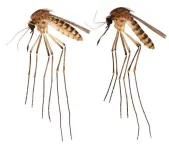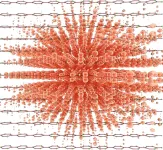(Press-News.org) A promising cancer drug that targets only cancer cells has been developed by researchers from the Norwegian University of Science and Technology (NTNU) and a university spin-off company, APIM Therapeutics.
NTNU has been responsible for the basic research. APIM Therapeutics has used the basic research to develop the medicine.
It has taken 18 years and more than EUR 20 million.
The medicine has now been tested on 20 cancer patients who were terminally ill. They had tried all available treatments, and as a last resort they opted to try a new option that was in the experimental stage.
Cancer stopped growing
The trials took place in Australia, where there are clinics that specialize in testing new medicines.
The results are very promising and have been published in a recognized cancer research journal. (ref oncogene species, Lemech et al)
Seventy percent of the patients who tested the medicine were stable after six weeks. Twelve continued the medication and were stable for 18 weeks. One woman took the medication for 17 months, and was stable for over two years.
In other words, the cancer stopped growing.
The aim of the testing in Australia was not primarily to check whether the medicine worked, but rather to determine whether it was toxic to humans.
It certainly wasn't toxic.
The medicine has previously been shown to both keep cancer at bay and defeat it in laboratory and animal experiments.
Marit Otterlei is behind all the research. She is a professor of molecular medicine at NTNU.
Patients avoid hair loss
With cancer, damage has occurred in the cells’ genetic material, so that the cells divide uncontrollably. Eventually, damaged cells accumulate and form a cancerous tumour.
“Cancer cells are more stressed than other cells. However, they don’t die but continue to grow even when they are damaged. Conventional cancer treatment with chemotherapy puts more stress on the cancer cells so that the cells eventually do die. Chemotherapy affects all cells, including the normal ones, such as in the hair follicles, and thus affects the whole body with many side effects like hair loss,” says Otterlei.
This is where her invention stands out.
The new cancer medicine that Otterlei has developed is called ATX-101. It only works on stressed cancer cells, and leaves the other healthy cells in the body alone.
One of the differences with this medicine is thus that cancer patients avoid losing their hair.
“ATX-101 can be used as the only treatment. It can stabilize the cancer as shown in the recently published studies, but the medicine can also help chemotherapy work even better so that you don't have to have so much of it,” says Otterlei.
From discovery to medicine
Simply put, the new cancer drug destroys cancer cells' ability to handle stress so that they die.
In slightly more complicated terms, the new cancer drug is a peptide that contains a special binding sequence, APIM, which is found in many different proteins that bind to a coordinator molecule called PCNA.
If you're still hanging in there, the further explanation is that more than 500 proteins can potentially bind to this coordinator molecule.
“Half of the proteins contain the binding sequences that we discovered, and yielded the name APIM for the sequence. We found that the APIM sequence is used to bind to PCNA mainly during stress, and it’s important for regulating stress in the cell. By blocking these bonds, the stress regulation will be destroyed,” says Otterlei.
All of this sounds pretty easy and straightforward in retrospect.
But the path from the biological discovery in the lab to applying this knowledge to treat people has taken 18 years.
The first obstacle was to create a medicine that worked in the same way as the biological discovery.
No real pharmaceutical industry in Norway
Otterlei and the team were able to create the medicine after many years of repeated trial and error, which then enabled them to obtain a patent.
The team also worked to understand how the coordinator molecule PCNA regulated various stress functions. Otterlei and her colleagues at NTNU recently published an article that showed that PCNA has a newly discovered role as a regulator of the metabolism in our cells (ref oncogene art, Røst et al).
The researchers believe this role is crucial for the stabilizing effect that the medicine has on cancer patients.
All the basic research is being carried out at NTNU, but since a university cannot be a commercial actor and produce medicine, Otterlei had to found a company and start a completely different pursuit than academic publishing.
That pursuit was the hunt for money and investors.
“We have no pharmaceutical industry for new medicines in Norway. What we’re working on is too long-term for most investors here. Clinical trials cost anywhere from ten million euros and upwards, and it’s extremely difficult to obtain enough funding. The big pharmaceutical companies want to have results from a Phase 2 clinical trial before they might be interested,” says Otterlei.
It has also been problematic to get support for the basic research surrounding the biological discovery itself, in great part because Otterlei has tried to commercialize and create a medicine.
“I’ve searched and searched. Without NTNU’s internal support, nothing would have come of all this,” says Otterlei.
Effectiveness of the medicine is now being checked
The development has now entered Phase 2. The testing in Australia (Phase 1) needed to show that the medicine was not toxic. Phase 2 needs to establish the effectiveness of the medicine, which is currently ongoing.
The medicine will now be tested in the USA on patients with sarcoma, a type of connective tissue cancer. In Australia, the medicine will be tested on ovarian cancer patients. Both clinical trials are being conducted in combination with chemotherapy.
However, even if the results from the trials are good, the way forward is still uncertain.
“A lot of medicines might work but don’t make it through the development process. The pharmaceutical industry doesn’t take on any projects they can’t profit from. What we develop has to work slightly better than current treatments, and preferably be cheaper to produce and have fewer side effects. Only then can an expensive development run pay off. It’s been a long run, and there’s still a long way to go,” says Otterlei.
Sources:
ATX-101, a cell-penetrating protein targeting PCNA, can be safely administered as intravenous infusion in patients and shows clinical activity in a Phase 1 study. Lemech, Charlotte Rose; Kichenadasse, Ganessan; Marschner, Jens-Peter; Alevizopoulos, Konstantinos; Otterlei, Marit; Millward, Michael. (2022) Oncogenes.
PCNA regulates primary metabolism by scaffolding metabolic enzymes. Røst LM, Ræder SB, Olaisen C, Søgaard CK, Sharma A, Bruheim P, Otterlei M.Oncogene. 2023 Feb;42(8):613-624. doi: 10.1038/s41388-022-02579-1. Epub 2022 Dec 23.PMID: 36564470
Identification of a novel, widespread, and functionally important PCNA-binding motif.Gilljam KM, Feyzi E, Aas PA, Sousa MM, Müller R, Vågbø CB, Catterall TC, Liabakk NB, Slupphaug G, Drabløs F, Krokan HE, Otterlei M.J Cell Biol. 2009 Sep 7;186(5):645-54. doi: 10.1083/jcb.200903138.PMID: 19736315
END
New medicine from Norwegian university spin-off extends terminally-ill cancer patients’ lives
The new drug targets only cancer cells, leaving healthy cells undamaged.
2023-03-22
ELSE PRESS RELEASES FROM THIS DATE:
The single protein that causes the fibrosis death spiral
2023-03-22
Fukuoka, Japan—Researchers from Kyushu University have found how a single mechanosensitive protein induces the process that thickens and scars tissue, known as fibrosis. The protein, called VGLL3, was shown to contribute to fibrosis in multiple organs.
The team hope their findings will lead to new treatments against fibrosis, a pathology that is attributed to 45% of all deaths in industrial nations. Their study was published in Nature Communications.
In response to any injury, the body immediately begins a stream of events. Blood coagulates, the tissue ...
New research shows prevalence of frailty among middle-aged adults; disparities in access to healthcare among frail, poorer Americans
2023-03-22
CHICAGO – March 21, 2023 – A new study from VillageMD Research Institute, in collaboration with a scientist from Harvard-affiliated Marcus Institute for Aging Research, demonstrates the prevalence of frailty in both middle-aged and older adults and frail patients’ challenges in accessing healthcare in the United States. This study was recently published in the Journal of the American Medical Directors Association titled “Self-Reported Frailty and Health Care Utilization in Community-Dwelling Middle-Aged and Older Adults ...
The challenge of keeping an audience engaged: how language shapes attention
2023-03-22
Researchers from University of Pennsylvania, University or Maryland, and Emory University published a new Journal of Marketing article that examines how and why the language used in content engages readers.
The study, forthcoming in the Journal of Marketing, is titled “What Holds Attention? Linguistic Drivers of Engagement” and is authored by Jonah Berger, Wendy W. Moe, and David A. Schweidel.
Everyone wants to hold an audience’s attention. Brands want consumers ...
New mosquito species reported in Florida
2023-03-22
Another new mosquito species has made its way across the tropics into Florida, making a permanent home in at least three counties. Scientists are concerned because of the rate of new mosquitoes arriving in Florida and the potential for them to transmit mosquito-borne diseases.
A mosquito known only by its scientific name, Culex lactator, is the latest to establish in the Sunshine State, according to a new study published in the Journal of Medical Entomology by faculty at the UF/IFAS Florida Medical Entomology Laboratory (UF/IFAS FMEL).
This species was first discovered ...
New simulation reveals secrets of exotic form of electrons called polarons
2023-03-22
A new leaf has turned in scientists' hunt for developing cutting-edge materials used in organic light-emitting diode (OLED) TV's, touchscreens, and more. The advance involves the polaron, a quasiparticle consisting of an electron and its surrounding distortions of atoms in a crystal lattice.
Simulations on the Texas Advanced Computing Center's (TACC) Frontera supercomputer have helped scientists map for the first time the conditions that characterize polarons in 2D materials, the thinnest materials that have ever been made.
"We charted a map to indicate in which materials polarons should be found, under what conditions, and the characteristics ...
New survey finds COVID-19 pandemic changed public’s view of obesity
2023-03-22
Nearly a third of Americans (29%) say COVID-19 made them more worried than ever about having obesity prompting about 28 million people to consider weight-loss methods they hadn’t thought about before the pandemic began, including nearly 6.4 million thought about turning to either weight-loss surgery or taking prescription anti-obesity drugs for the first time, according to a new survey whose findings were published online in the peer-reviewed journal, Surgery for Obesity and Related Diseases (SOARD).
Another nearly 1 in 5 people (18%) said they were more likely to initiate a discussion about their weight with their physician specifically because ...
Searching for life with space dust
2023-03-22
Following enormous collisions, such as asteroid impacts, some amount of material from an impacted world may be ejected into space. This material can travel vast distances and for extremely long periods of time. In theory this material could contain direct or indirect signs of life from the host world, such as fossils of microorganisms. And this material could be detectable by humans in the near future, or even now.
When you hear the words vacuum and dust in a sentence, you may groan at the thought of having ...
Hunting Venus 2.0: Scientists sharpen their sights
2023-03-22
With the first paper compiling all known information about planets like Venus beyond our solar system, scientists are the closest they’ve ever been to finding an analog of Earth’s “twin.”
If they succeed in locating one, it could reveal valuable insights into Earth’s future, and our risk of developing a runaway greenhouse climate as Venus did.
Scientists who wrote the paper began with more than 300 known terrestrial planets orbiting other stars, called exoplanets. They whittled the list down to the five most likely to ...
New research reveals a potential mechanism for how coffee may reduce the risk of type 2 diabetes
2023-03-22
New scientific research investigates inflammation and insulin resistance in habitual coffee drinkers to understand how coffee may reduce the risk of type 2 diabetes (T2D), mediated by inflammatory biomarkers in the body 1.
Drinking just one additional cup of coffee per day was associated with a 4-6% lower risk of T2D among participants in two large prospective cohort studies, which was partly explained by lower levels of inflammation1.
Experts consider consuming up to 400mg of caffeine (3-5 cups of coffee) per day to be a moderate and safe amount for most adults. For pregnant or lactating women, caffeine intake should be reduced to 200mg per day2.
These results further support previous ...
Big firms are failing to reduce unconscious bias against disabled people
2023-03-22
Working for a big company or in an HR role does not lower the likelihood of showing unconscious bias against disabled people at work, a new study finds.
Researchers say this is ‘surprising’ because of the money many large firms spend on EDI and unconscious bias training – in 2017 up to $8bn in the US alone – and the fact HR professionals are often specifically trained in EDI issues.
The research, a collaboration between the University of Exeter’s Business School and Medical ...
LAST 30 PRESS RELEASES:
Hairdressers could be a secret weapon in tackling climate change, new research finds
Genetic risk for mental illness is far less disorder-specific than clinicians have assumed, massive Swedish study reveals
A therapeutic target that would curb the spread of coronaviruses has been identified
Modern twist on wildfire management methods found also to have a bonus feature that protects water supplies
AI enables defect-aware prediction of metal 3D-printed part quality
Miniscule fossil discovery reveals fresh clues into the evolution of the earliest-known relative of all primates
World Water Day 2026: Applied Microbiology International to hold Gender Equality and Water webinar
The unprecedented transformation in energy: The Third Energy Revolution toward carbon neutrality
Building on the far side: AI analysis suggests sturdier foundation for future lunar bases
Far-field superresolution imaging via k-space superoscillation
10 Years, 70% shift: Wastewater upgrades quietly transform river microbiomes
Why does chronic back pain make everyday sounds feel harsher? Brain imaging study points to a treatable cause
Video messaging effectiveness depends on quality of streaming experience, research shows
Introducing the “bloom” cycle, or why plants are not stupid
The Lancet Oncology: Breast cancer remains the most common cancer among women worldwide, with annual cases expected to reach over 3.5 million by 2050
Improve education and transitional support for autistic people to prevent death by suicide, say experts
GLP-1 drugs like Ozempic could cut risk of major heart complications after heart attack, study finds
Study finds Earth may have twice as many vertebrate species as previously thought
NYU Langone orthopedic surgeons present latest clinical findings and research at AAOS 2026
New journal highlights how artificial intelligence can help solve global environmental crises
Study identifies three diverging global AI pathways shaping the future of technology and governance
Machine learning advances non targeted detection of environmental pollutants
ACP advises all adults 75 or older get a protein subunit RSV vaccine
New study finds earliest evidence of big land predators hunting plant-eaters
Newer groundwater associated with higher risk of Parkinson’s disease
New study identifies growth hormone receptor as possible target to improve lung cancer treatment
Routine helps children adjust to school, but harsh parenting may undo benefits
IEEE honors Pitt’s Fang Peng with medal in power engineering
SwRI and the NPSS Consortium release new version of NPSS® software with improved functionality
Study identifies molecular cause of taste loss after COVID
[Press-News.org] New medicine from Norwegian university spin-off extends terminally-ill cancer patients’ livesThe new drug targets only cancer cells, leaving healthy cells undamaged.





